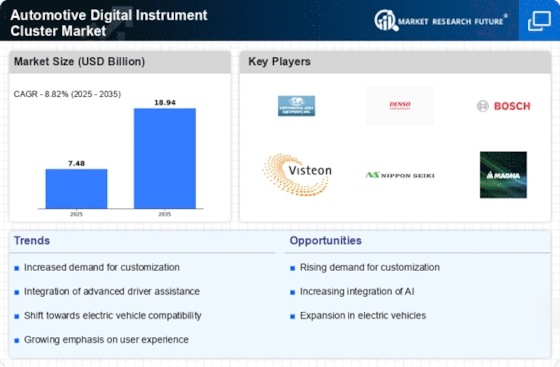Top Industry Leaders in the Automotive Digital Instrument Cluster Market

*Disclaimer: List of key companies in no particular order
Top listed companies in the Automotive Digital Instrument Cluster industry are:
Continental AG
Nvidia Corporation
Robert Bosch GmbH
Nippon Seiki
Visteon Corporation
IAC Group
Panasonic
Delphi Technologies
Magneti Marelli S.p.A.
Denso Corporation
Sharp Corporation
Alpine Electronics, Inc.
Mitsubishi Electric Corporation
Luxoft
Yazaki Corporation
ID4Motion
Nippon Seiki Company Ltd.
The Competitive Landscape of Automotive Digital Instrument Clusters
The automotive digital instrument cluster market is revving up, driven by a relentless pursuit of technological innovation and consumer demand for enhanced driving experiences. This dynamic space boasts a competitive landscape where established giants and nimble startups grapple for market share. Let's delve into the strategies powering these key players, the factors shaping market dominance, and the emerging trends pushing the boundaries of this ever-evolving market.
Dominant players like Continental, Bosch, and Visteon hold a formidable position, leveraging their established relationships with major automakers and their vast portfolios of sophisticated cluster technologies. Continental, for instance, focuses on connectivity solutions, integrating navigation, ADAS functionalities, and driver information into a seamless cluster experience. Bosch, meanwhile, prioritizes customization and scalability, offering modular clusters adaptable to different vehicle segments. Visteon, on the other hand, emphasizes user experience, employing advanced human-machine interface design principles to ensure an intuitive and engaging interaction.
Market share analysis in this arena hinges on several key factors. While technology prowess plays a pivotal role, factors like cost-effectiveness, design aesthetics, and compatibility with emerging trends become equally crucial. Regional variations in consumer preferences and regulatory requirements also come into play. For instance, in luxury car segments, high-resolution displays and immersive augmented reality features might sway buyer decisions, whereas mid-range segments might prioritize affordability and value-added features like smartphone integration.
New and emerging trends are reshaping the competitive landscape, demanding strategic agility from key players. The rise of electric vehicles has spurred the development of cluster displays tailored for EV-specific information needs, such as battery range and energy consumption monitoring. Additionally, the integration of advanced driver-assistance systems (ADAS) is blurring the lines between instrument clusters and information hubs, necessitating clusters that can seamlessly present complex data in a driver-friendly way. Cybersecurity considerations are also gaining prominence, as connected clusters become vulnerable to potential hacking threats.
Startups and smaller players are injecting fresh ideas into the market, often challenging the dominance of established players through niche innovations. Companies like Aptiv and Magna International are focusing on advanced display technologies like curved OLED screens and head-up displays, offering immersive and personalized driving experiences. Meanwhile, tech giants like Google and Apple are entering the fray through collaborations with automakers, aiming to seamlessly integrate their software ecosystems into car dashboards.
The overall competitive scenario in the automotive digital instrument cluster market is one of intense but healthy competition. Established players are constantly innovating to maintain their lead, while newcomers are bringing fresh perspectives and disruptive technologies to the table. As technology advances and consumer demands evolve, the battle for market share will likely intensify, with players vying to offer the most intuitive, informative, and captivating driving experiences possible.
The automotive digital instrument cluster market is a dynamic and exciting space. Understanding the strategies of key players, the factors shaping market share, and the emerging trends is crucial for navigating this competitive landscape. As technology continues to evolve, one thing is certain: the future of automotive dashboards is bright, offering a multitude of possibilities for a more informed, connected, and ultimately, more enjoyable driving experience.
Latest Company Updates:
Continental AG:
- October 2023: Continental announced a partnership with Baidu to develop a next-generation digital instrument cluster with enhanced driver assistance features and personalized content. (Source: Continental press release)
Nvidia Corporation:
- December 2023: Nvidia unveiled its Drive Hyperion 8 platform for autonomous vehicles, which includes a high-resolution digital instrument cluster powered by the Ampere architecture. (Source: Nvidia blog)
Robert Bosch GmbH:
- October 2023: Bosch introduced its new Virtual Cockpit, a fully customizable digital instrument cluster with augmented reality features. (Source: Bosch press release)
Nippon Seiki:
- August 2023: Nippon Seiki launched its next-generation cluster system with a 3D holographic display for enhanced safety and driver information. (Source: Nippon Seiki press release)










